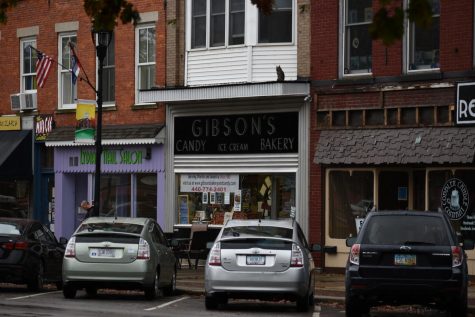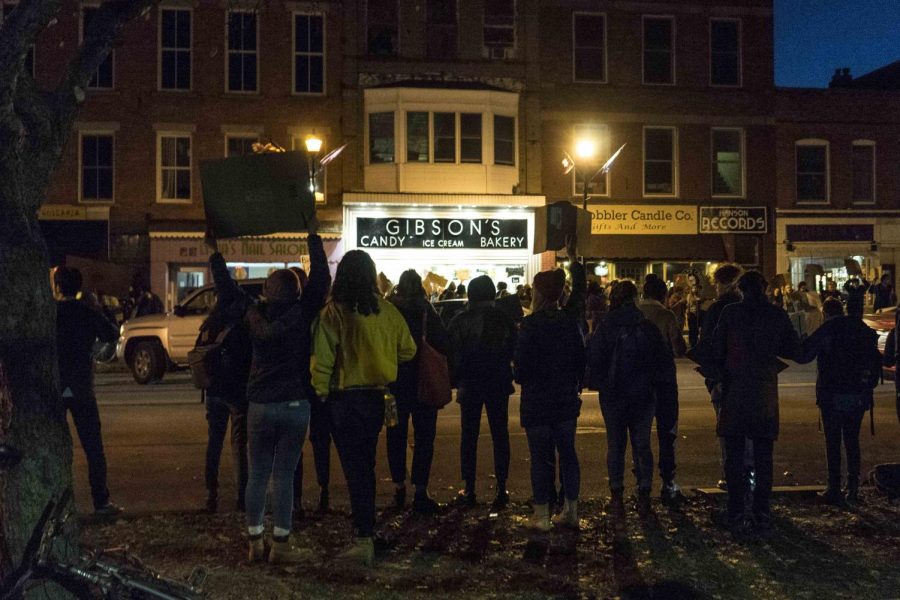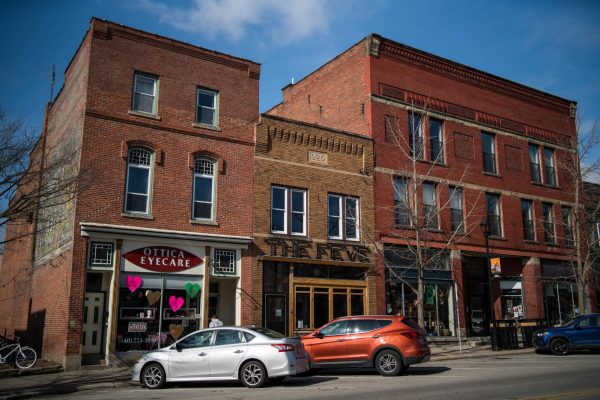Oberlin College v. Gibsons Bros., Inc.
Students protest outside of Gibson’s Bakery in late 2016.
The Original Incident
On Nov. 9, 2016, three Oberlin College students — Elijah Aladin, Enida Lawrence, and Cecelia Whettstone — were taken into custody by the Oberlin Police Department on charges of shoplifting and assault. Aladin, Lawrence, and Whettstone were Black students at Oberlin. The incident took place in Gibson’s Bakery where, according to the police report, Allyn Gibson Jr. confronted the three students for underage purchase of alcohol and shoplifting. Allyn Jr. is the son of the bakery’s former owner David Gibson and grandson of Allyn Gibson Sr.
“Allyn stated Aladin attempted to leave the store, so Allyn took out his phone and attempted to take a picture of Aladin, and that’s when Aladin slapped Allyn’s hand and phone and caused it to strike Allyn in the face,” the report reads.
According to eye-witness testimony and the police report, the students and Allyn Jr. were then involved in an altercation, though the report and some testimonies differ on the original aggressor. Allyn Jr. is quoted in the police report as claiming not to have thrown punches at Aladin — instead he grabbed Aladin to stop his aggression. Andy Goelzer, OC ’18, was quoted in the Review as a witness to the incident, and claimed that Allyn Jr. escalated the physical conflict.
“[Aladin] was literally just standing there, and Allyn Gibson comes running from the back of the store screaming, ‘Shoplifter!’ and grabs him,” Goelzer said. “The kid is like, ‘Get off me, I’m not doing anything.’ At this point, people in the store are starting to yell, ‘Get off him,’ ‘What are you doing?’’

Oberlin College’s Gibson’s Litigation FAQ page explains that some members of the College administration considered the police report to be problematic.
“The police report included only testimonies from members of the Gibson family and employees,” the page reads. “Testimonies from the three students involved in the altercation were not included, nor were narratives from multiple witnesses who provided written statements to the police.”
Oberlin Police Lieutenant Michael McCloskey explained that store employees are legally allowed to detain shoplifting suspects if they have probable cause. He added that OPD does not recommend this approach because it often leads to situations escalating.
“The Ohio Revised Code does allow store proprietors or employees of those stores to detain and arrest shoplifters,” McCloskey said. “If they have probable cause to believe that someone is trying to take items from the store, they can legally, in a reasonable manner, detain them for a length of time until police get there to arrest the suspect.”
Police detained Lawrence and Whettstone for assault and arrested Aladin. Lawrence and Whettstone were charged with misdemeanors and soon released on bail, while Aladin was transferred to Lorain County Jail and charged with robbery, a felony in Ohio. The prosecutor on the case, the three students, and the proprietors of Gibson’s all agreed to a plea bargain that would have reduced all charges to misdemeanors. The judge rejected the deal and forced the case to trial in the County Court. The three students plead guilty to attempted theft and aggravated trespassing, with Aladin also pleading guilty to underage purchase of alcohol. Aladin maintained innocence of theft and robbery.
Whettstone and Lawrence were each initially sentenced to 270 days in prison, and Aladin was sentenced to 300. However, the terms of the final plea deals suspended prison time in return for one year of good behavior, a fine, restitution payment toward Allyn Jr., and an allocution which read “I believe the employees of Gibson’s actions were not racially motivated. They were merely trying to prevent an underage sale.”
Oberlin College Students Protest
On Nov. 10, students gathered outside the bakery in protest of the incident. Students accused the Gibsons of having racially profiled the three students and handed out flyers that claimed the establishment had a long history of racist behavior. Allyn Jr., who was involved in the altercation, was not an owner of the bakery.
“This is a racist establishment with a long account of racial profiling and discrimination,” the flyers read. “Today we urge you to shop elsewhere. … A member of our community was assaulted by the owner of this establishment yesterday. A nineteen y/o young man was apprehended and choked by Allyn Gibson of Gibson’s Food Mart & Bakery.”
The same day as the protests, Student Senate passed a resolution calling for the College to terminate its contracts with Gibson’s. The resolution also called on then-President Marvin Krislov and then-Vice President and Dean of Students Meredith Raimondo, as well as other administrators and the general faculty, to condemn Gibson’s treatment of students. Krislov and Raimondo responded to the resolution in a college-wide email on Nov. 11.
“1) We are grateful for the determination of our students and for the leadership demonstrated by Student Senate. Dean Meredith Raimondo and her team have worked to support students and families affected by these events, and will continue to do so. 2) Tita Reed, Special assistant for government and community relations, has reached out to Mr. Gibson to engage in dialogue that will ensure that our broader community can work and learn together in an environment of mutual respect free of discrimination.”
Bon Appetit Management Company, the former managers of Campus Dining Services, suspended its catering contract with Gibson’s on Nov. 14, allegedly at Raimondo’s instruction. Gibson’s had, up to that point, provided the dining halls with certain baked goods. The contract was reinstated on Feb. 2, 2017.
Gibson’s Bros., Inc., David and Allyn Sr. File Lawsuit
On Nov. 7, 2017, Gibson’s Bros., Inc., David R. Gibson, and Allyn W. Gibson (commonly known as Allyn Sr.) filed a lawsuit against Oberlin College and Conservatory and former Dean of Students Meredith Raimondo. The suit was filed in the Court of Common Pleas in Lorain County. The Plaintiffs alleged eight counts against Oberlin College and Conservatory including libel, slander, and intentional infliction of emotional distress. Each count carried a minimum penalty of $25,000. Included in the Gibsons’ rationale for filing the suit was consideration to an alleged persistence of defamation by the College.
“Oberlin College’s guides advise prospective and future students and their families not to shop at Gibson’s Bakery because it is a “racist

establishment” that “assaults students,” the document reads.
The first and second counts of libel and slander, respectively, accused Oberlin College representatives such as former President Marvin Krislov and other unnamed defendants of defamatory conduct against Gibson’s. The Plaintiffs stated that as a result of the defendants’ malice, they suffered “injury to their personal and business reputations, and mental anguish.” The Gibsons argued that the contents of an Oberlin College Student Senate resolution and a separate flyer, distributed by Raimondo, damaged their reputation.
Another key part of the suit is the Plaintiff’s accusation of Tortious Interference with Business Relationships, constituting elements of Count three.
“Upon information and belief, Oberlin College and Dean Raimondo intentionally and improperly interfered with the contractual and business relationship between Gibson’s Bakery and Bon Appetit Management Company, causing such relationship to cease.”
Count six of the complaint alleged that the College intentionally inflicted emotional distress on the Plaintiffs.
“As a direct and proximate result of Defendants’ conduct, these Plaintiffs have suffered great distress concerning the damage to their reputation, economic welfare, community standing, ability to continue to employ hard-working members of the community, and fear of physical harm.”
In response, the College and Raimondo rejected the claims and planned to be represented by the same counsel in defense of the allegations. The Director of Media Relations Scott Wargo wrote to the Review that the allegations were false and stated the College’s intent to defend against them in court. Wargo added that the College would once again end its business relationship with the bakery.
“We are saddened that the Gibson family has chosen to pursue litigation,” Wargo wrote. “As this is now a legal matter, the College will suspend, effectively immediately, its business relationships with Gibson’s Bakery until such a time as a mutually productive relationship may be re-established.”
On Dec 6, 2017, Oberlin College filed a motion to dismiss counts seven and eight in the suit: negligent hiring, retention, or supervision; and trespass respectively. The College and Raimondo’s lawyers argued that the Plaintiffs had no evidence of negligence on Raimondo or the College’s end. They also pointed out that Gibson’s claim of Oberlin protesters trespassing in the parking lot behind the bakery fails because the Plaintiffs do not own that property. While David Gibson has a majority stake in Off Street Parking Inc., neither David nor his son Allyn Jr. own property under Off Street Parking. On Jan 5, 2018, Judge John R. Miraldi granted the Defendants motion to dismiss the two counts.
In late April 2019, it was announced that the lawsuit would go to trial on May 9. Shortly after the trial began, the College gave a statement reaffirming its belief that neither Defendant had defamed the Gibsons.
Though it was not known to the public at the time, the College had submitted evidence before the trial court that represented Allyn Jr.’s opinions on Black people. The trial judge excluded this evidence from being presented to the jury during the trial. Allyn Jr. had posted a series of Facebook posts between 2012 and 2017. The evidence was sealed and only made available to the public in September 2021. Allyn Jr. was not a party to the defamation suit, which is why the evidence was sealed and did not weigh on the jury’s decision.
“I wasn’t racist ever … but this **** and the way people treat me now because I am “white” is racist and is making me racist,” Allyn Jr. wrote. “I don’t owe a damn person a damn thing. If these lazy ***** want to start working then they could earn their own money. That’s what my family does for money … work.”
In June 2019, a Lorain County jury ruled in the bakery’s favor, announcing $11 million in compensatory damages and an additional $33.2 million in punitive damages. The jury found Oberlin College and Raimondo guilty of libel (Count one), improper interference between Gibson’s and Bon Appetit (Count three), and intentional infliction of emotional distress (Count six). Judge James Miraldi capped the total award at $25.049 million, citing precedent that punitive damages could not exceed double the amount of compensatory damages. Miraldi assigned an additional $6.565 million in attorney fees owed to the Gibsons.
The College and Gibson’s Appeal Judge Miraldi’s Ruling
Oberlin College submitted an appeal Oct. 8, 2019 to the Lorain County Court of Common Pleas’ June verdict. Gibson’s Bakery filed a cross-appeal later that month challenging the final cap on damages awarded. Both appeals were filed with the Ninth District Court of Ohio in Akron.
Oberlin’s appeal was divided into three separate points of contention: that the Gibson team had failed to prove that the College met the standards for libel; that there were irregularities with the trial including the alleged erroneous omission of certain testimony; and that the damages awarded were exorbitant in relation to proof of harm provided by the Plaintiffs.
The Gibsons’ appeal argued that their constitutional rights were violated when Judge Miraldi implemented a cap on punitive damages. The appeal placed the amount awarded in contrast to the College’s endowment, and made the claim that a cap on punitive damages would not sufficiently deter future behavior. The Gibsons also alleged the judge improperly denied them an expert witness, and incorrectly ruled on summary judgements.
On March 31, 2022, the Court of Appeals of Ohio Ninth Appellate District rejected both Oberlin’s and the Gibsons’ appeals. Judge Donna J. Carr wrote an opinion for the appellate court upholding the trial court. Carr’s opinion explained that the flier distributed during the protests proved to be “an actionable state of fact,” not a constitutionally protected opinion, and was therefore subject to libel laws. Carr’s opinion also referenced the significant media attention around this case, and emphasized that the court would not be examining the broader question of how this ruling might affect First Amendment rights.
“The sole focus of this appeal is on the separate conduct of Oberlin and Raimondo that allegedly caused damage to the Gibsons, not on the First Amendment rights of individuals to voice opinions or protest,” Carr wrote.
On May 13 of this year, the College submitted an appeal to the lower court’s decision to the Ohio Supreme Court. On Aug. 30, the Supreme Court denied hearing the appeal. The College announced its decision to pay the Gibsons the full sum of $36.59 million last Thursday. For more detailed coverage of the final stages of this litigation, read “College to Pay $36M, Concluding Gibson’s Litigation,” published in the Review last week.







